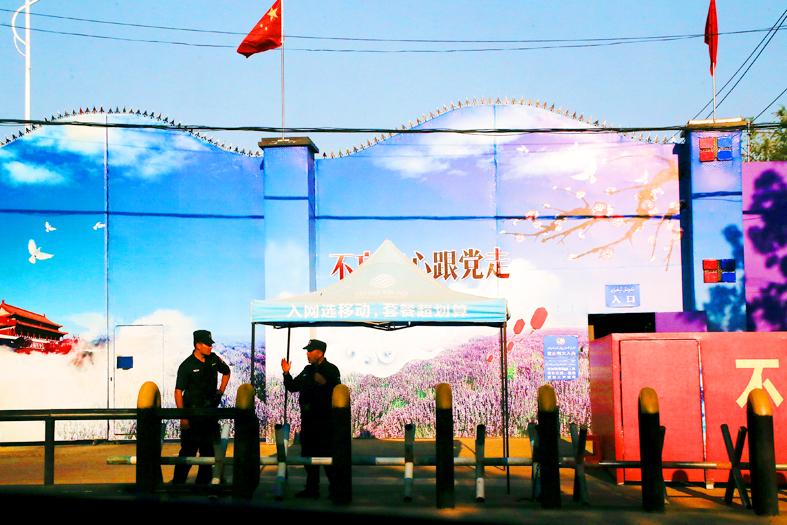Beijing’s reshuffle of officials in Xingjiang might herald a hardening of repression against Uighurs, an academic at the Institute for National Defense and Security Research said.
Since 2018, the Chinese Communist Party (CCP) has replaced a slew of top officials in Xinjiang’s communist party, researcher Shih Chien-yu (侍建宇) wrote in a Nov. 9 post on the institute’s blog.
Last month, the government reshuffled three top officials of the regions’ communist party, which marks a near-total turnover of its leadership since 2018, Shih said.

Photo: Reuters
The newcomers include He Zhongyou (何忠友), who is to become the deputy secretary of the Standing Committee for the Xinjiang Uighur Autonomous Region, a position of significant power, he said.
Local party secretary Chen Quanguo (陳全國), the only leader of the old guard remaining, would likely be dismissed at the CCP’s National Congress next year, he said.
The reshuffling meant that the CCP has removed virtually every regional official who was sanctioned by the US and its allies, he said.
The move is designed to test Western resolve in imposing new sanctions, as the newcomers would almost certainly continue to carry out repressive policies, Shih said.
Although China’s governance of Xinjiang has been widely criticized by the international community for human rights abuses, the CCP believes that it has made no mistakes, he said.
Instead, it blamed local officials for their failure to represent the party’s achievements in a positive light and their lack of local knowledge as outsiders who had been appointed to the region, he said.
He, an apparatchik trained in data analysis and management at the London School of Economics and University of Massachusetts Boston, has substantial experience in China’s mass surveillance program, Shih said.
He’s professional qualifications are a fit for Xinjiang — a region fast becoming a test bed for digital surveillance technologies — and he has experience in working with foreign officials and press from previous posts, he said.
Beijing increasingly considers Xinjiang a strategic launching pad to expand China’s sphere influence, while the rise of a Taliban-controlled Afghanistan further elevates the importance of security in the region, Shih said.
These factors suggest that Beijing would continue to utilize the “high-pressure” tactics it favored to tighten its grip on Xinjiang, while employing propaganda to conceal its actions, he said.

An essay competition jointly organized by a local writing society and a publisher affiliated with the Chinese Communist Party (CCP) might have contravened the Act Governing Relations Between the People of the Taiwan Area and the Mainland Area (臺灣地區與大陸地區人民關係條例), the Mainland Affairs Council (MAC) said on Thursday. “In this case, the partner organization is clearly an agency under the CCP’s Fujian Provincial Committee,” MAC Deputy Minister and spokesperson Liang Wen-chieh (梁文傑) said at a news briefing in Taipei. “It also involves bringing Taiwanese students to China with all-expenses-paid arrangements to attend award ceremonies and camps,” Liang said. Those two “characteristics” are typically sufficient

A magnitude 5.9 earthquake that struck about 33km off the coast of Hualien City was the "main shock" in a series of quakes in the area, with aftershocks expected over the next three days, the Central Weather Administration (CWA) said yesterday. Prior to the magnitude 5.9 quake shaking most of Taiwan at 6:53pm yesterday, six other earthquakes stronger than a magnitude of 4, starting with a magnitude 5.5 quake at 6:09pm, occurred in the area. CWA Seismological Center Director Wu Chien-fu (吳健富) confirmed that the quakes were all part of the same series and that the magnitude 5.5 temblor was

The brilliant blue waters, thick foliage and bucolic atmosphere on this seemingly idyllic archipelago deep in the Pacific Ocean belie the key role it now plays in a titanic geopolitical struggle. Palau is again on the front line as China, and the US and its allies prepare their forces in an intensifying contest for control over the Asia-Pacific region. The democratic nation of just 17,000 people hosts US-controlled airstrips and soon-to-be-completed radar installations that the US military describes as “critical” to monitoring vast swathes of water and airspace. It is also a key piece of the second island chain, a string of

The Central Weather Administration has issued a heat alert for southeastern Taiwan, warning of temperatures as high as 36°C today, while alerting some coastal areas of strong winds later in the day. Kaohsiung’s Neimen District (內門) and Pingtung County’s Neipu Township (內埔) are under an orange heat alert, which warns of temperatures as high as 36°C for three consecutive days, the CWA said, citing southwest winds. The heat would also extend to Tainan’s Nansi (楠西) and Yujing (玉井) districts, as well as Pingtung’s Gaoshu (高樹), Yanpu (鹽埔) and Majia (瑪家) townships, it said, forecasting highs of up to 36°C in those areas